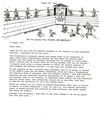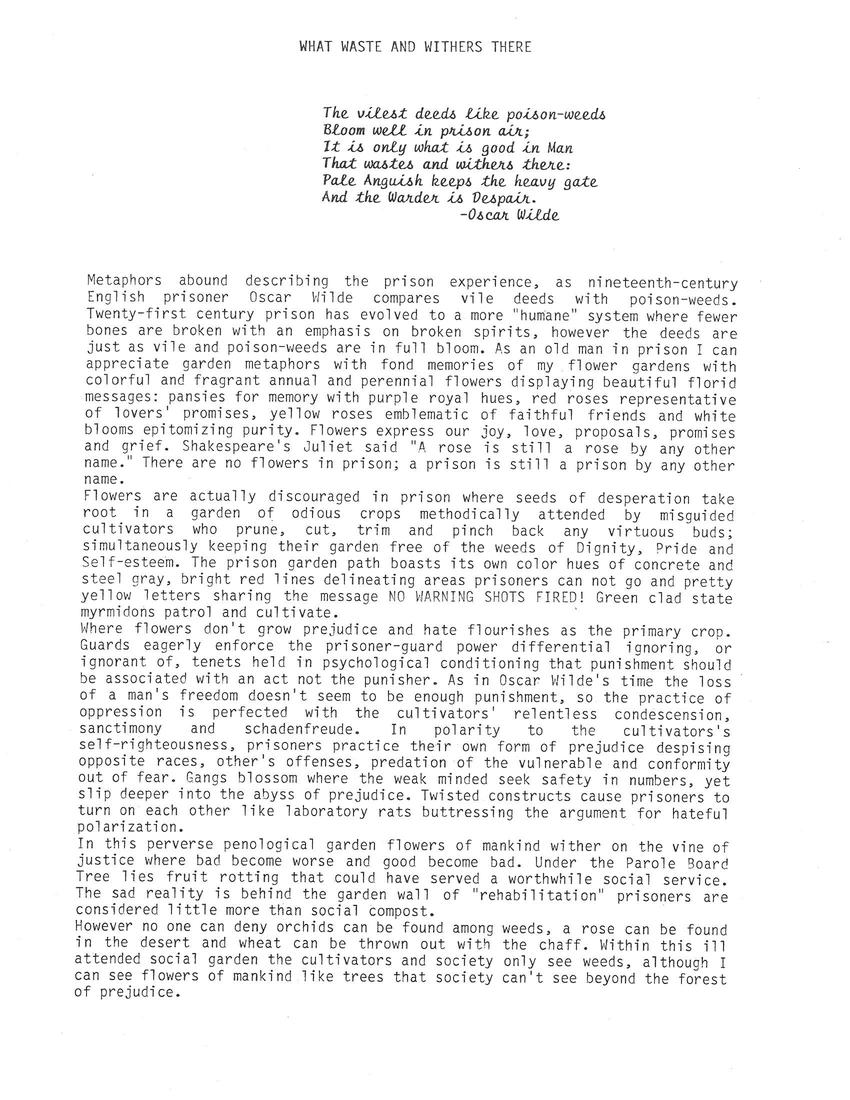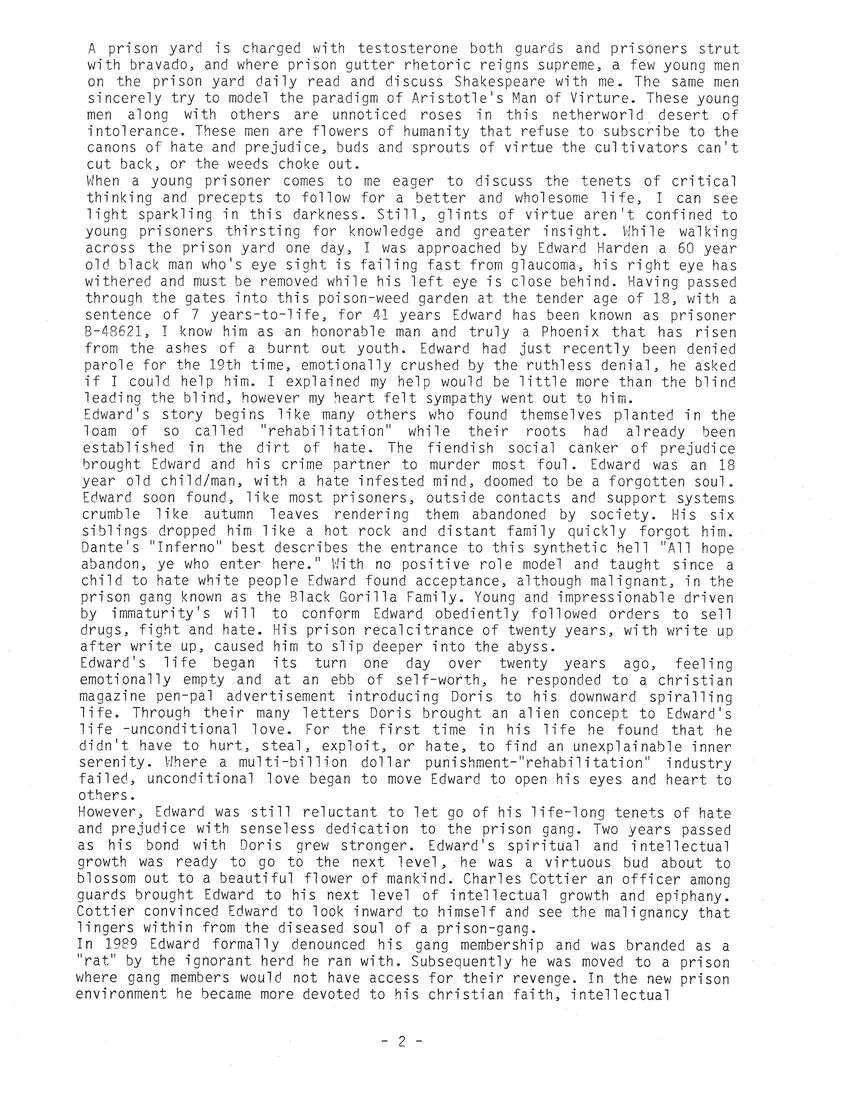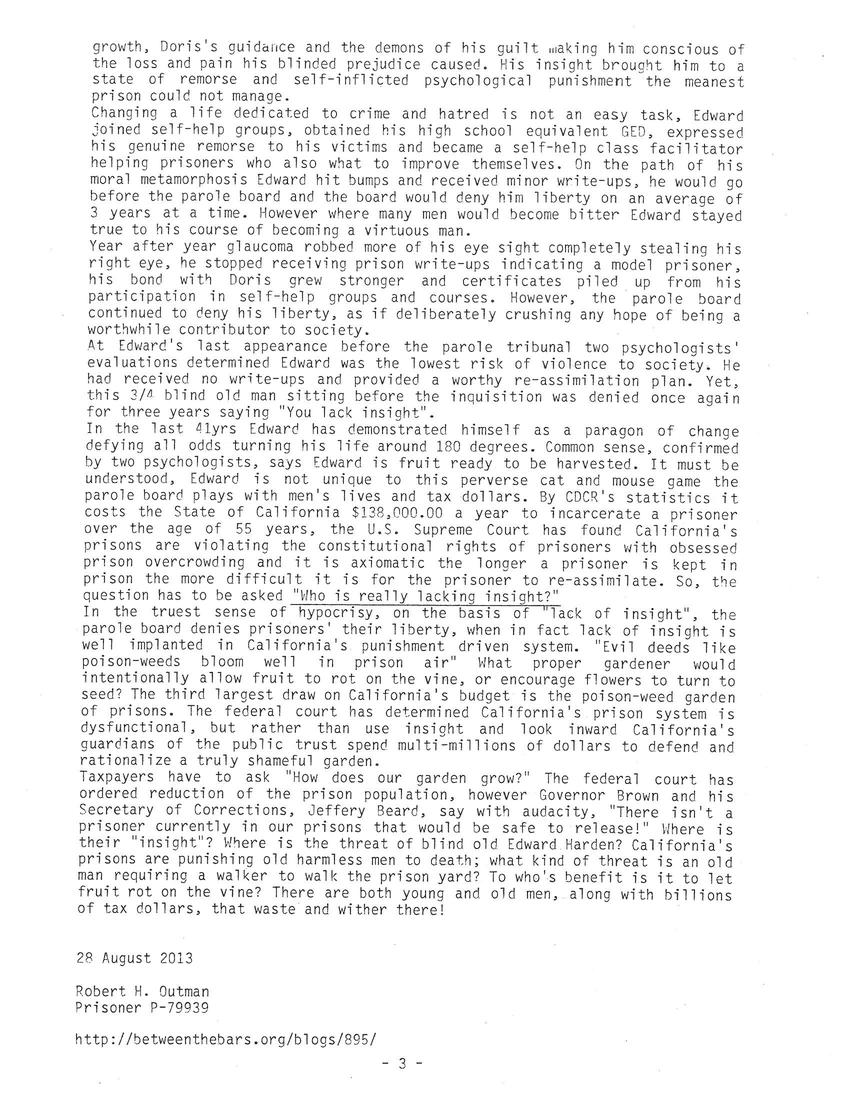

Transcription
PAGE 1/3
WHAT WASTE AND WITHERS THERE
The Vilest deeds like poison-weeds
Bloom well in prison air;
It is only what is good in Man
That wastes and withers there:
Pale Anguish keeps the heavy gate
And the Warder is despair.
- Oscar Wilde
Metaphors abound describing the prison experience, as nineteenth - century
English prisoner Oscar Wilde compares vile deeds with poison-weeds.
Twenty-first century prison has evolved to a more "humane" system where fewer
bones are broken with an emphasis on broken spirits, however the deeds are
just as vile and poison-weeds are in full bloom. As an old man in prison I can
appreciate garden metaphors with fond memories of my flower gardens with
colorful fragrant annual and perennial flowers displaying beautiful florid
messages: pansies for memory with purple royal hues, red roses representative
of lovers' promises, yellow roses emblematic of faithful friends and white
blooms epitomizing purity. Flowers express our joy, love, proposals, promises
and grief. Shakespeare's Juliet said "A rose is still a rose by any other
name." There are no flowers in prison; a prison is still a prison by any other
name.
Flowers are actually discouraged in prison where seeds of desperation take
root in a garden of odious crops methodologically attended by misguided
cultivators who prune, cut, trim and pinch back any virtuous buds;
simultaneously keeping their garden free of the weeds of Dignity, Pride and
Self-esteem The prison garden path boasts its own color hues of concrete and
steel gray, bright red lines delineating areas prisoners cannot go and pretty
yellow letters sharing the message NO WARNING SHOTS FIRED! Green clad state
myrmidons patrol and cultivate.
Where Flowers don't grow prejudice and hate flourishes as the primary crop.
Guards eagerly enforce the prisoner-guard power differential ignoring, or
ignorant of tenets held in psychological conditioning that punishment should
be associated with an act not the punisher. As in Oscar Wilde's time the loss
of a man's freedom doesn't seem to be enough punishment, so the practice of
oppression is perfected with the cultivators' relentless condescension,
sanctimony and schadenfreude. In popularity to the cultivators'
self-righteousness, prisoners practice their own form of prejudice despising
opposite races, other's offenses, predation of the vulnerable and conformity
out of fear. Gangs blossom where the weak minded seek safety in numbers, yet
slip deeper into the abyss of prejudice. Twisted constructs cause prisoners to
turn on each other like laboratory rats buttressing the argument for hateful
polarization.
In this perverse penological garden flowers of mankind wither on the vine of
justice where bad becomes worse and good becomes bad. Under the Parole Board
Tree lies fruit rotting that could have been served a worthwhile social service.
The sad reality is behind the garden wall of 'rehabilitation' prisoners are
considered little more than social compost.
However no one can deny orchids can be found among weeds, a rose can be found
in the desert and wheat can be thrown out with the chaff. Withing this ill
attended social garden the cultivators and society only see weeds, although I
can see flowers of mankind like trees that society can't see beyond the forest
of prejudice.
PAGE 2/3
A prison yard is charges with testosterone both guards and prisoners strut
with bravado, and where prison gutter rhetoric reigns supreme, a few young men
on the prison yard daily read and discuss Shakespeare with me. The same men
sincerely try to model the paradigm of Aristotle's Man of Virtue. These young
men along with others are unnoticed roses in this netherworld desert of
intolerance. These men are flowers of humanity that refuse to subscribe to the
canons of hate and prejudice, buds and sprouts of virtue the cultivators can't
cut back, or the weeds choke out.
When a young prisoner comes to me eager to discuss the tenets of critical
thinking and precepts to follow for a better and wholesome life, I can see
light sparking in this darkness. Still, glints of virtue aren't confined to
young prisoners thirsting for knowledge and greater insight. While walking
across the prison yard one day, I was approached by Edward Harden a 60 year
old black man who's eye sight is failing fast from glaucoma, his right eye has
withered and must be removed while his left eye is close behind. Having passed
through the gates into this poison-weed garden at the tender age of 18, with a
sentence of 7 years-to-life, for 41 years Edward has been known as prisoner
B - 48621, I know him as an honorable man and truly a Phoenix that has risen
from the ashes of a burnt out youth. Edward has just recently been denied
parole for the 19th time, emotionally crushed by ruthless denial, he asked
if I could help him. I explained my help would be little more than the blind
leading the blind, however my heart felt sympathy went out to him.
Edward's story begins like so many others who found themselves planted in the
loam of so called "rehabilitation" while their roots had already been
established in the dirt of hate. The fiendish social canker of prejudice
brought Edward and his crime partner to murder most foul. Edward was an 18
year old child/man, with a hate infested mind, doomed to be a forgotten soul.
Edward soon found, like most prisoners, outside contacts and support systems
crumble like autumn leaves rendering them abandoned by society. His six
siblings dropped him like a hot rock and distant family quickly forgot him.
Dante's "Inferno" best describes entrance to this synthetic hell "All hope
abandon, ye who enter here." With no positive role model and taught since a
child to hate white people Edward found acceptance, although malignant, in the
prison gang known as the Black Gorilla Family. Young and impressionable driven
by immaturity's will to conform Edward obediently followed orders to sell
drugs,fight and hate. His prison recalcitrance of twenty years, with write up
after write up, caused him to slip deeper into the abyss.
Edward's life began its turn one day over twenty years ago, feeling
emotionally empty and at an ebb of self-worth, he responded to a christian
magazine pen-pal advertisement introducing Doris to his downward spiraling
life. Through their many letters Doris brought an alien concept to Edward's
life - unconditional love. For the first time in his life he found that he
didn't have to hurt, steal, exploit, or hate, to find an un-explainable inner
serenity. Where a multi-billion dollar punishment- "rehabilitation" industry
failed, unconditional love began to move Edward to open his eyes and heart to
others.
However, Edward was still reluctant to let go of his life-long tenants of hate
and prejudice with senseless dedication to the prison gang. Two years passed
and his bond with Doris grew stronger. Edward's spiritual and intellectual
growth was ready to go to the next level, he was a virtuous bud about to
blossom out to a beautiful flower of mankind. Charles Cottier an officer among
guards brought Edward to his next level of intellectual growth and epiphany.
Cottier convinced Edward to look inward to himself and see the malignancy that
lingers within from the deceased soul of a prison-gang.
In 1989 Edward formally denounced his gang membership and was branded as a
"rat" by the ignorant herd he ran with. Subsequently he was moved to a prison
where gang members would not have access for their revenge. In the new prison
environment he became more devoted to his christian faith, intellectual
-2-
PAGE 3/3
growth, Doris's guidance and the demons of his guilt waking him conscious of
the loss and pain his blinded prejudice caused. His insight brought him to a
state of remorse and self-inflicted psychological punishment the meanest
prison could not manage.
Changing a life dedicated to crime and hatred is not an easy task, Edward
joined self-help groups, obtained his high school equivalent GED, expressed
his genuine remorse to his victims and became a self-help class facilitator
helping prisoners who also want to improve themselves. On the path of his
moral metamorphosis Edward hit bumps and received minor write-ups, he would go
before the parole board and the board would deny him liberty on an average of
3 years at a time. However where many men would become bitter Edward stayed
true to his course of becoming a virtuous man.
Year after year glaucoma robbed more of his eye sight completely stealing his
right eye, he stopped receiving prison write-ups indicating a model prisoner,
his bond with Doris grew stronger and certificates piled up from his
participation in self-help groups and courses. However, the parole board
continued to deny his liberty, as if deliberately crushing any hope of being a
worthwhile contributor to society.
At Edwards last appearance before the parole tribunal of two psychologists'
evaluations determined Edward was the lowest risk of violence to society . He
had received no write-ups and provided a worthy re-assimilation plan. Yet,
this 3/4 blind old man sitting before the inquisition was denied once again
for three years saying "You lack insight".
In the last 41 years Edward has demonstrated himself as a paragon of change
defying all odds turning his life around 180 degrees. Common sense, confirmed
by two psychologists, says Edward is fruit ready to be harvested. It must be
understood, Edward is not unique to this perverse cat and mouse game the
parole board plays with men's lives and tax dollars. By CDCR's statistics it
costs the State of California $138,000.000 a year to incarcerate a prisoner
over the age of 55 years, the U.S. Supreme Court has found California's prisons
are violating the constitutional rights of prisoners with obsessed
prison overcrowding and it is axiomatic the longer a prisoner is kept in
prison the more difficult it is for the prisoner to re-assimilate. Sp, the
question has to be asked "Who is really lacking insight?"
In the truest sense of hypocrisy, on the basis of "lack of insight", the
parole board denies prisoners' their liberty, when in fact lack of insight is
well implanted in California's punishment driven system. Evil deeds like
poison-weeds bloom well in prison air". What proper gardener would
intentionally allow fruit to rot on the vine, or encourage flowers to turn to
seed? The third largest draw on California's budget is the poison-weed garden
of prisons. The federal court has determined California's prison system is
dysfunctional, but rather than use insight and look inward California's
guardians of the public trust spend multi-millions of dollars to defend and
rationalize a truly shameful garden.
Taxpayers have to ask "How does our garden grow?" The federal court has
ordered reduction of the prison population, however Governor Brown and his
Secretary of Corrections , Jeffery Beard, say with audacity, "There isn't a
prisoner currently in our prisons that would be safe to release!" Where is
their "insight?" Where is the threat of blind old Edward Harden? California's
prisons are punishing old harmless men to death; what kind of threat is an old
man requiring a walker to walk the prison yard? To who's benefit is it to let
fruit rot on the vine? There are both young and old men, along with billions
of tax dollars, that waste and wither there!
28 August 2013
Roberty H. Outman
Prisoner P-79939
http:betweenthebars.org/blogs/895/
-3-

Other posts by this author
|
2025 oct 5

|
2025 sep 23

|
2025 aug 3

|
2025 jun 25

|
2025 jun 25

|
2025 may 10

|
More... |




Replies (5)
Wow. Thank you so much for writing this incredibly powerful and eloquent peice. You and the people you speak of in this blog are truly an inspiration and a chastisement to many of us outside prison walls.
"They think a murderer's heart would taint
Each simple seed they sow.
It is not true! God's kindly earth
Is kindlier than men know,
And the red rose would but blow more red,
The white rose whiter blow.
Out of his mouth a red, red rose!
Out of his heart a white!
For who can say by what strange way,
Christ brings his will to light,
Since the barren staff the pilgrim bore
Bloomed in the great Pope's sight?
But neither milk-white rose nor red
May bloom in prison air;
The shard, the pebble, and the flint,
Are what they give us there:
For flowers have been known to heal
A common man's despair."
You are clearly a very intelligent man, with a great knowledge of life.
Edwards story is a very sad but i'm sure extremely common one ,all over the world.. people need to recognise change and allow it to grow rather than stamp all over it before it has a chance to blossom.